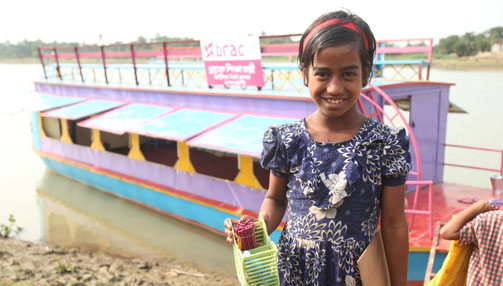The UK’s long standing partnership with Bangladesh’s research and development community has been absolutely critical to the country’s remarkable progress over the last forty years.

This is what Dr Mushtaque Chowdhury, Vice-Chair of BRAC, the world’s largest international non-government organisation (based in Bangladesh) told Whitehall officials, MPs, academics and charity leaders this week at an event in Westminster hosted by Anne Main MP for the All Party Parliamentary Group for Bangladesh and The Impact Initiative and convened by the Institute of Development Studies.
Dr Chowdhury said: ‘Collaboration between Bangladesh and the UK has helped to increase our understanding of how to break the cycle of extreme poverty. This learning around what works could make a significant contribution to the reduction of poverty in all of its forms globally, thereby reducing low and middle income countries’ need for aid.’
Key successes
Since independence in 1971 Bangladesh has graduated to lower middle-income status, reduced poverty, improved health services and education provision and modernised agriculture. Life expectancy at birth has increased by 18 years and Bangladesh has overtaken India in terms of human development progress.
The UK’s partnership with Bangladeshi organisations like BRAC has included a big focus on researching approaches to reducing poverty permanently. The UK’s Economic and Social Research Council (ESRC) and Department for International Development (DFID) joined forces ten years ago to set up the Joint Fund for Poverty Alleviation Research. The Fund has supported 150 research projects worldwide and has been influential in the design of interventions such as BRAC’s ground-breaking ‘Targeting the Ultra Poor Programme’ which has helped to lift 5-6 million Bangladesh men, women and children out of extreme poverty.
In his address to UK MPs, Dr Chowdhury explained that turning around the gender dimension to life expectancy was a particular success to be celebrated. In the 1980s Bangladesh was one of the only countries where women lived shorter lives than men, the average life expectancy for women is now 71 – more than the average life expectancy for men.
Addressing the challenges ahead
Looking to the future, key speakers remarked that while many first generation problems in Bangladesh are being solved, second generation problems – such as climate change and non-communicable diseases – present enormous challenges.
Rushanara Ali MP, the UK Prime Minister’s Trade Envoy to Bangladesh, warned that economic growth, education and poverty reduction will be undermined if we are unable to tackle climate change. She also stressed the importance of improving infrastructure and addressing governance issues and labour standards in order to strengthen Bangladesh’s opportunities in relation to trade and economic growth.
In addressing challenges such as these, solid research, partnerships and strong political commitment will continue to be vital. This was reaffirmed in comments from Saul Walker, Chief of Staff, Asia, Caribbean and Over Seas Territories at Department for International Development at the UK Department for International Development, who highlighted DFID’s commitment to research for development and emphasised the importance of understanding context and the importance of learning from successes in Bangladesh.
Despite the many continuing challenges the country faces, Bangladesh’s development progress provides valuable lessons for the wider South Asia region and proves that development assistance can reduce countries’ dependency on aid from the UK and elsewhere.
Closing the event, IDS Research Fellow, Naomi Hossain remarked: ‘Bangladesh is an example to show that aid can work. And aid done well transforms lives. It doesn’t work everywhere in the same way and that is where research plays a vital role. UK aid investment in Bangladesh has represented high value for money, and resulted in long-term change, as well as being able to take learning from what has worked to scale and around the world.’